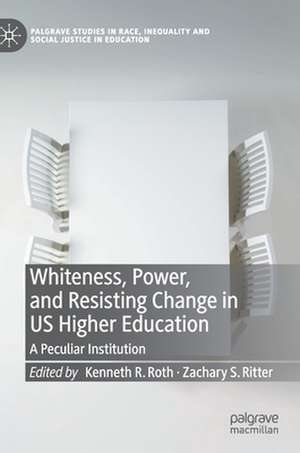Whiteness, Power, and Resisting Change in US Higher Education: A Peculiar Institution: Palgrave Studies in Race, Inequality and Social Justice in Education
Editat de Kenneth R. Roth, Zachary S. Ritteren Limba Engleză Hardback – 23 dec 2020
| Toate formatele și edițiile | Preț | Express |
|---|---|---|
| Paperback (1) | 773.24 lei 6-8 săpt. | |
| Springer International Publishing – 23 dec 2021 | 773.24 lei 6-8 săpt. | |
| Hardback (1) | 728.28 lei 6-8 săpt. | |
| Springer International Publishing – 23 dec 2020 | 728.28 lei 6-8 săpt. |
Preț: 728.28 lei
Preț vechi: 888.14 lei
-18% Nou
Puncte Express: 1092
Preț estimativ în valută:
139.36€ • 145.80$ • 115.76£
139.36€ • 145.80$ • 115.76£
Carte tipărită la comandă
Livrare economică 02-16 aprilie
Preluare comenzi: 021 569.72.76
Specificații
ISBN-13: 9783030572914
ISBN-10: 3030572919
Pagini: 244
Ilustrații: XV, 244 p. 1 illus.
Dimensiuni: 148 x 210 mm
Greutate: 0.46 kg
Ediția:1st ed. 2021
Editura: Springer International Publishing
Colecția Palgrave Macmillan
Seria Palgrave Studies in Race, Inequality and Social Justice in Education
Locul publicării:Cham, Switzerland
ISBN-10: 3030572919
Pagini: 244
Ilustrații: XV, 244 p. 1 illus.
Dimensiuni: 148 x 210 mm
Greutate: 0.46 kg
Ediția:1st ed. 2021
Editura: Springer International Publishing
Colecția Palgrave Macmillan
Seria Palgrave Studies in Race, Inequality and Social Justice in Education
Locul publicării:Cham, Switzerland
Cuprins
1. Historical Scaffolds of Whiteness in Higher Education.- 2. Confronting Ourselves: An Autoethnographic Approach to Whiteness in Higher Education.- 3. Counter-Narratives as Critical Invitations for Change: Race-Centered Policy Making and Backlash at Peculiar Institutions.- 4. International Students Need Not Apply: Impact of US Immigration Policy in the Trump Era on International Student Enrollment and Campus Experiences.- 5. Neoliberalism, Neopopulism, and Democracy in Decline: The University Under Attack on Multiple Fronts.- 6. A Matter of Academic Freedom.- 7. Changing Pathways of Historically Black Colleges and Universities: Any Place for Afrocentric Ideas?.- 8. The Changing Exasperations of Higher Education.- 9. Resisting the Neoliberal university via a General Strike.- 10. Abolish the Lecturer: A Manifesto for Faculty Equity.- 11. Racist Algebra of Abjection: A Template of Racial Violence.
Notă biografică
Kenneth R. Roth is a Research Associate with the CHOICES program at the University of California, Los Angeles, USA, where he examines access and equity issues in higher education, with particular emphasis on the challenges and paths to graduation experienced by students of color, particularly Black males.
Zachary S. Ritter is Interim Associate Dean of Students at California State University, Dominguez Hills, USA. He also teaches social justice history at both California State University, Dominguez Hills, USA, and University of California, Los Angeles, USA. He recently co-edited Marginality in the Urban Center: The Costs and Challenges of Continued Whiteness in the Americas and Beyond (2019).
Zachary S. Ritter is Interim Associate Dean of Students at California State University, Dominguez Hills, USA. He also teaches social justice history at both California State University, Dominguez Hills, USA, and University of California, Los Angeles, USA. He recently co-edited Marginality in the Urban Center: The Costs and Challenges of Continued Whiteness in the Americas and Beyond (2019).
Textul de pe ultima copertă
This edited volume connects the origins of US higher education during the Colonial Era with current systemic characteristics that maintain white supremacist structures and devalue students and faculty of color, as well as areas of study that interrogate Whiteness. The authors examine power structures within the academy that scaffold Whiteness and promote inequality at all levels by maintaining a two-tier faculty system and a dearth of Faculty and Administrators of Color. Finally, contributors offer systemic and collective solutions toward a more equitable redistribution of power, primarily among faculty and administration, through which other inequities may be identified and more easily addressed.
Caracteristici
Examines administrative and organizational responses to grassroots resistance in higher education Presents new strategies and models to replace those that maintain exclusionary Whiteness doctrine Prompts administrators and university leaders to consider new ways to share campus power, democratize systems, and listen more closely to student voices





